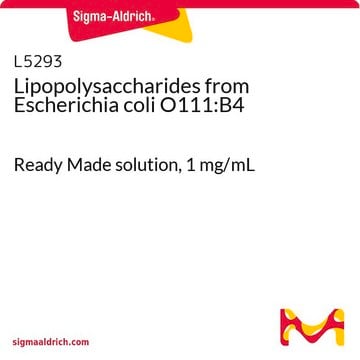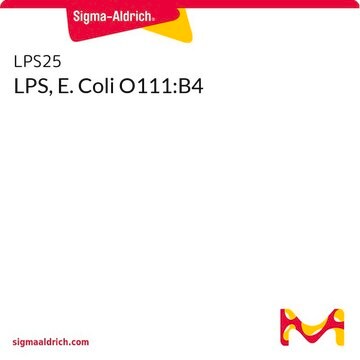L3023
Lipopolysaccharides from Escherichia coli O111:B4
Detoxified
Synonyme(s) :
LPS
About This Item
Produits recommandés
Source biologique
Escherichia coli (O111:B4)
Niveau de qualité
Forme
lyophilized powder
Couleur
white to beige
Solubilité
water: soluble
Conditions d'expédition
ambient
Température de stockage
2-8°C
Vous recherchez des produits similaires ? Visite Guide de comparaison des produits
Description générale
Application
Actions biochimiques/physiologiques
Notes préparatoires
Autres remarques
Produit(s) apparenté(s)
Mention d'avertissement
Danger
Mentions de danger
Conseils de prudence
Classification des risques
Acute Tox. 2 Oral
Code de la classe de stockage
6.1A - Combustible acute toxic Cat. 1 and 2 / very toxic hazardous materials
Classe de danger pour l'eau (WGK)
WGK 3
Point d'éclair (°F)
Not applicable
Point d'éclair (°C)
Not applicable
Équipement de protection individuelle
Eyeshields, Gloves, type N95 (US)
Certificats d'analyse (COA)
Recherchez un Certificats d'analyse (COA) en saisissant le numéro de lot du produit. Les numéros de lot figurent sur l'étiquette du produit après les mots "Lot" ou "Batch".
Déjà en possession de ce produit ?
Retrouvez la documentation relative aux produits que vous avez récemment achetés dans la Bibliothèque de documents.
Les clients ont également consulté
Contenu apparenté
Lipopolysaccharide (LPS) is a major component of Gram-negative bacteria, important for microbiological research.
Lipopolysaccharide (LPS) is a major component of Gram-negative bacteria, important for microbiological research.
Lipopolysaccharide (LPS) is a major component of Gram-negative bacteria, important for microbiological research.
Lipopolysaccharide (LPS) is a major component of Gram-negative bacteria, important for microbiological research.
Notre équipe de scientifiques dispose d'une expérience dans tous les secteurs de la recherche, notamment en sciences de la vie, science des matériaux, synthèse chimique, chromatographie, analyse et dans de nombreux autres domaines..
Contacter notre Service technique



